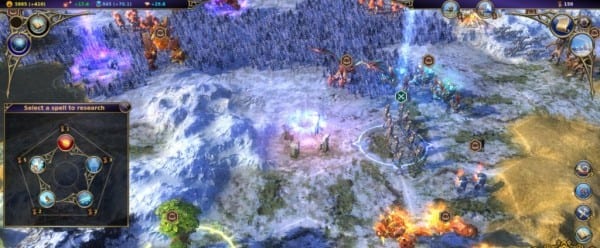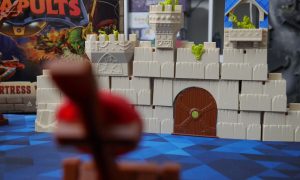 As a turn-based 4X game, Warlock: Master of the Arcane will naturally generate some comparisons to to the Civilization series. The interface and combat mechanics, which are eerily similar to that of Sid Meier’s now infamous line of games, certainly seem to encourage that comparison. Those elements are where the similarities end, however; Warlock: Master of the Arcane takes place in a fantasy world where magic spells and mystical creatures play a large role.
As a turn-based 4X game, Warlock: Master of the Arcane will naturally generate some comparisons to to the Civilization series. The interface and combat mechanics, which are eerily similar to that of Sid Meier’s now infamous line of games, certainly seem to encourage that comparison. Those elements are where the similarities end, however; Warlock: Master of the Arcane takes place in a fantasy world where magic spells and mystical creatures play a large role.
You play as one of seven Great Mages, who are competing to grow their empires in the world of Ardania. You can accomplish this by recruiting units in your cities to fight for you, winning over the favor of the gods, and using any of the many spells at your disposal. Although a series of tutorials are provided to help you navigate your first few turns, I wouldn’t rely on them. They are rarely helpful  and you will mostly have to figure things out on your own. In fact, most of the things you would expect to help you gain your bearings within the lore of the world are either missing or inadequate. There is supposed to be a story underlying your actions, but it is never explained or elaborated on as you play though the game. Although the developers have released a separate online manual and beginner’s guide, an in-game encyclopedia would do wonders to give some context to the world and the dozens of spells, creatures, and buildings that exist within it. As it is, you are playing blind and won’t know what’s out there waiting for you until you run into it.
and you will mostly have to figure things out on your own. In fact, most of the things you would expect to help you gain your bearings within the lore of the world are either missing or inadequate. There is supposed to be a story underlying your actions, but it is never explained or elaborated on as you play though the game. Although the developers have released a separate online manual and beginner’s guide, an in-game encyclopedia would do wonders to give some context to the world and the dozens of spells, creatures, and buildings that exist within it. As it is, you are playing blind and won’t know what’s out there waiting for you until you run into it.
Unlike other games in the 4X genre which seek to balance the development of your own cities and the destruction of your  enemies’, Warlock focuses heavily on the combat elements with everything else left feeling pretty underdeveloped. In addition to being able to conquer cities and take out monsters, you will eventually run into other Great Mages who are similarly trying to expand their control and influence. The diplomacy system is a disappointment, however. Upon meeting another Great Mage for the first time, you can either declare war or attempt to placate them with gifts and pacts. Regardless of how generous you are, the other Great Mages are quite bloodthirsty
enemies’, Warlock focuses heavily on the combat elements with everything else left feeling pretty underdeveloped. In addition to being able to conquer cities and take out monsters, you will eventually run into other Great Mages who are similarly trying to expand their control and influence. The diplomacy system is a disappointment, however. Upon meeting another Great Mage for the first time, you can either declare war or attempt to placate them with gifts and pacts. Regardless of how generous you are, the other Great Mages are quite bloodthirsty  and will constantly demand more of your resources under threat of military action. There is no “soft” diplomacy or negotiating back and forth; you can only comply or prepare for war. Even if you agree to continuously sacrifice your gold and mana to keep everyone happy, peace is never guaranteed. Alliances are broken and wars declared, often for no reason at all. This takes away any impetus for going off and discovering the other worlds in the Warlock universe. Why spend the time and resources exploring another world when there are more immediate threats from the temperamental Great Mages of this one?
and will constantly demand more of your resources under threat of military action. There is no “soft” diplomacy or negotiating back and forth; you can only comply or prepare for war. Even if you agree to continuously sacrifice your gold and mana to keep everyone happy, peace is never guaranteed. Alliances are broken and wars declared, often for no reason at all. This takes away any impetus for going off and discovering the other worlds in the Warlock universe. Why spend the time and resources exploring another world when there are more immediate threats from the temperamental Great Mages of this one?
Diplomacy is not the only area where the AI suffers. At times, you will shake your head in amusement as an enemy moves the sa me unit back and forth for several turns, accomplishing nothing at all. Later, you might watch in disbelief and frustration as several enemy units appear out of thin air at the borders of a vulnerable city in your empire. Equally puzzling, the other Great Mages will often leave large swaths of land at their borders unclaimed, despite there being no deterrents to city spamming and infinite expansion. However, border tensions and a number of other elements will affect your relationships with them and often lead to even more of the aforementioned aggressiveness.
me unit back and forth for several turns, accomplishing nothing at all. Later, you might watch in disbelief and frustration as several enemy units appear out of thin air at the borders of a vulnerable city in your empire. Equally puzzling, the other Great Mages will often leave large swaths of land at their borders unclaimed, despite there being no deterrents to city spamming and infinite expansion. However, border tensions and a number of other elements will affect your relationships with them and often lead to even more of the aforementioned aggressiveness.
Whether by design or as a result of these AI flaws, the game is very combat-oriented and it’s nice to see that it handles those mechanics well. While there are no spell or unit trees to let you foresee your progression, it’s fun to build up a force and venture out to conque r new territory with the tools you have at your disposal. The more land you control, the more resources and buildings you can amass and there is a certain satisfaction in being able to expand your empire — even if it is only secondary to increasing the number of mages, werewolves, or other units you can recruit. City development is rather simplistic, with most of your settlements having a singular focus of generating food to feed your army, money to recruit them, mana to assist them with spells, or pumping out the army units themselves. The game was able to keep me playing to that end, despite not offering much beyond those shallow interactions with the world.
r new territory with the tools you have at your disposal. The more land you control, the more resources and buildings you can amass and there is a certain satisfaction in being able to expand your empire — even if it is only secondary to increasing the number of mages, werewolves, or other units you can recruit. City development is rather simplistic, with most of your settlements having a singular focus of generating food to feed your army, money to recruit them, mana to assist them with spells, or pumping out the army units themselves. The game was able to keep me playing to that end, despite not offering much beyond those shallow interactions with the world.
The other elements of the game don’t stand out much one way or the other. The sound is nothing special and the voiceovers are annoying, but the game does look nice. While certainly not breathtaking, the graphics are very fitting and the interface i s easy enough to navigate after a short learning curve. The controls are mostly mouse-based, which is a mistake in my opinion. I would love to see some customizable keyboard hotkeys to make certain tasks easier to access. There are also a number of bugs which, while rarely game-breaking, detract from the overall experience. To their credit, the developers have shown a strong willingness to improve the game with two patches being released within a week or so of the game’s arrival.
s easy enough to navigate after a short learning curve. The controls are mostly mouse-based, which is a mistake in my opinion. I would love to see some customizable keyboard hotkeys to make certain tasks easier to access. There are also a number of bugs which, while rarely game-breaking, detract from the overall experience. To their credit, the developers have shown a strong willingness to improve the game with two patches being released within a week or so of the game’s arrival.
Turn-based strategy games by their very nature often straddle an interesting place between tedious and addictive. The latter is required to make the former worth the effort. Unfortunately for Warlock: Master of the Arcane, u npolished gameplay and stiff competition from other titles in the genre leave an otherwise enjoyable game feeling unfinished. It’s decent fun for the $20 price point, but good graphics and a nice interface aren’t enough to mask poor AI and a complete lack of depth. I felt like a beta tester during most of the time I spent playing. In fact, if this was a beta instead of the final release, I could actually get pretty excited about this title. I could believe that the diplomacy, AI, and story were lacking only because they were still being developed. That’s perhaps the most disappointing thing about the game: underneath a poor execution lies several really good ideas that some extra time in development could have brought out.
npolished gameplay and stiff competition from other titles in the genre leave an otherwise enjoyable game feeling unfinished. It’s decent fun for the $20 price point, but good graphics and a nice interface aren’t enough to mask poor AI and a complete lack of depth. I felt like a beta tester during most of the time I spent playing. In fact, if this was a beta instead of the final release, I could actually get pretty excited about this title. I could believe that the diplomacy, AI, and story were lacking only because they were still being developed. That’s perhaps the most disappointing thing about the game: underneath a poor execution lies several really good ideas that some extra time in development could have brought out.
Breanna has been gaming since infancy, if gnawing on an unattended controller counts as playing a game. One of the younger members of the Gaming Trend family, she dabbled in PC games as a kid but wasn't fully consumed by the hobby until the sixth generation of consoles. Now an avid PC and console gamer, she looks forward to the day when she can scape together enough cash to join the next gen club.
In the last week of middle school, a math teacher taught her how to program a calculator; she was pretty much hooked then and there. Currently working towards a degree in Computer Science and Applied Math, Breanna hope to someday make games instead of just writing about them. Other hobbies include playing guitar, binge-watching Netflix, and cooking delicious food.

See below for our list of partners and affiliates:























